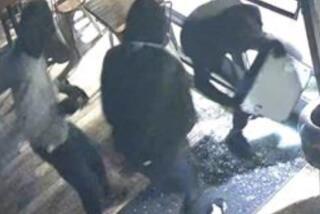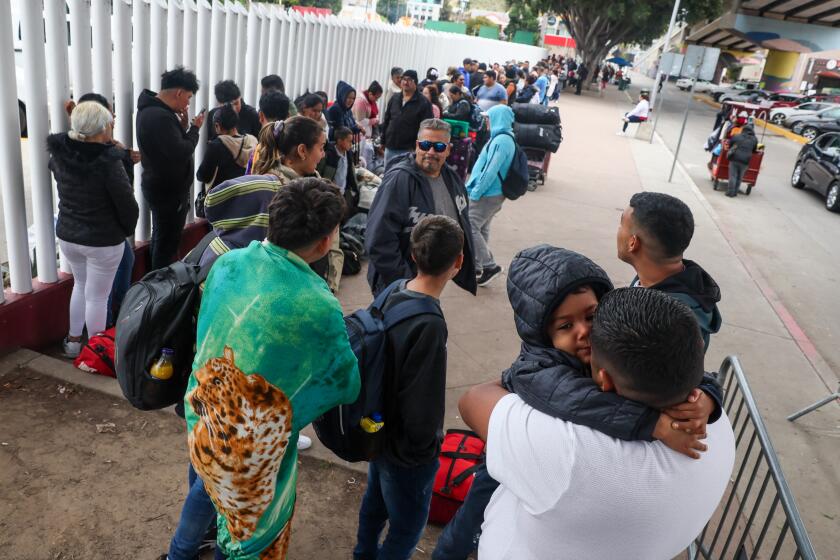Agents Raid Sweatshops, Arrest 55 at 3 Sites : Garments: Federal investigators say workers included 39 Thais who may have been paying off debts. Clothes appeared to be headed for major retailers.
Federal agents swooped in on three suspected sweatshops and arrested 55 people early Wednesday, including 39 Thai workers who authorities suspect were toiling to pay off travel debts to professional smugglers.
Investigators from the Immigration and Naturalization Service and Department of Labor acted jointly on one of many tips received by the INS since the highly publicized shutdown of a clandestine garment factory in El Monte on Aug. 2. Officials say more than 70 Thai workers toiled in slave-like conditions at that sweatshop.
No direct link between the El Monte operation and the three Los Angeles sites has emerged, officials said. They added that the merchandise, like that at the El Monte site, may have been destined for major retailers, including J.C. Penney.
“It looks like the authentic, expensive clothing you’d find at expensive stores,” U.S. Department of Labor Investigator Francisco J. Ocampo said as he stood among the hundreds of blouses and jerseys produced on 24 sewing machines at one of the three factories. “These are not knockoffs.”
Interviews of workers in the three facilities raided Wednesday produced evidence of “minimum wage, overtime, child labor and record-keeping violations,” Ocampo said. “Pretty much everything there is under” federal law.
Unlike the El Monte factory, authorities said, the three shops raided Wednesday were not forced-labor operations. The workers--most of them illegal immigrants--were apparently free to come and go, although some may have lived at the sites, officials said.
Moreover, authorities said two of the three sites were state-licensed and the license of a third expired Aug. 16. The El Monte site was unlicensed.
But the INS believes that the Thai nationals at the three Los Angeles shops, like those in El Monte, may have been smuggled in and employed in a form of debt peonage sometimes used by Asian smuggling rings.
“We believe most of the undocumented Thai nationals involved in this venture were brought to this country expressly to work in these sweatshops, where they were required to labor until they repaid the cost of their passage to the United States,” said Richard K. Rogers, INS district director in Los Angeles.
Federal authorities--harshly criticized for closing an initial INS investigation of the El Monte site in 1992 after prosecutors judged there was insufficient proof to secure a warrant--used a different strategy this time, seeking a warrant two weeks after launching the investigation. Unlike the 1992 investigation, proof emerged quickly of possible illegal immigrants at the Los Angeles locations, said Jim Hayes, acting assistant district director for the INS.
Among those arrested Wednesday were at least three suspected principals in the operations, who could face smuggling and other criminal charges, authorities said. All the principals are Thai and Laotian nationals. The three sites are believed to be linked, officials said.
Most of the 55 arrested are women and are suspected of illegally working at the sites. They included 39 Thai nationals, 2 Laotians and others from Mexico and Central America. A 12-year-old girl who is a U.S. citizen was also found working part-time at one of the sites.
With the El Monte case making international headlines, investigators are attempting to determine the extent of smuggling Thai workers to Southern California apparel outlets. The El Monte workers have told investigators they believed they were working off $5,000 in debts owed to the ring that brought them in, officials say.
“There could be more Thai workers out there whom we’re not familiar with,” said William C. Buhl, regional administrator of the U.S. Department of Labor, which investigates violations of federal minimum wage and overtime laws.
*
Although not as sensational as the site in El Monte, the shops raided Wednesday once again expose the underside of Los Angeles’ booming apparel industry. In recent years, the area’s garment trade, largely dependent on immigrant labor, has surpassed New York’s as the nation’s largest.
“Unfortunately, these are typical of the kinds of violations we find in the garment industry,” Buhl said.
All three sites are believed to have been subcontract operations that produced garments for Los Angeles-area manufacturers, which in turn sold the goods to major retailers. As in the El Monte case, investigators are seeking to trace the destination of the sweatshop-produced clothing. In some cases, manufacturers may be held liable for wage violations found at the shops with which they subcontract, authorities said.
Clothing manufactured at one site is believed to have eventually made its way to J.C. Penney, the giant retailing chain, Buhl said. Company representatives could not be reached for comment.
By early afternoon, Buhl said, investigators had documented $210,000 worth of wage violations, dating back two years, at two of the shops raided.
State authorities identified those companies as: Good Line, 1643 N. Indiana St., and ASC Fashion, 865 N. Virgil Ave. Authorities are still investigating potential wage violations at the third site, Virgil Apparel, 3109 1/2 Beverly Blvd., Buhl said.
Federal authorities say the El Monte case has resulted in scores of tips, including the one that broke this case, and could help to unveil similar cases.
All three sites were in largely immigrant neighborhoods, from Westlake west of Downtown to the Eastside.
At the Beverly Boulevard factory, with its sole entry in an alley behind a mini-mall housing a video shop and a medical clinic, federal investigators combed shipping records, clothing labels and wage reports Wednesday afternoon for hard evidence of labor violations.
Near the time cards, which contained mainly Thai and Latino names, they found garment labels for several clothing lines including Structure, Express, Hunt Club, Accomplice, Weekends and Paul Harris and the Original Arizona Jean Co. The labels looked authentic, authorities said, although officials cannot be positive without further investigation.
On a table outside the office rested three file folders with the words “The J.C. Penney Manual,” written in black marker on the covers. The folders contained J.C. Penney quality control manuals, translated into Spanish, federal investigators said.
On a nearby wall was a chart citing federal wage standards.
Manuel Gonzales, another U.S. Department of Labor investigator, said that in initial interviews many of the Beverly factory workers said they were paid the minimum wage of $4.25 an hour. But most appeared “to have been coached in what to say” by their supervisors, he added.
*
The sewing shop, neighbors said, moved into the unmarked alley building several months ago; its doors were usually closed. “Basically, it looked normal,” said the operator of an adjacent photo studio. “Workers came in the early morning and in the late afternoon.”
As investigators searched for evidence inside the building, one factory worker leaned against the wall of the alley outside, worrying about his future.
“It’s a good place to work,” said Fabio Lara, 28, a quality control inspector. “I hope I can work again.”
More to Read
Start your day right
Sign up for Essential California for news, features and recommendations from the L.A. Times and beyond in your inbox six days a week.
You may occasionally receive promotional content from the Los Angeles Times.






